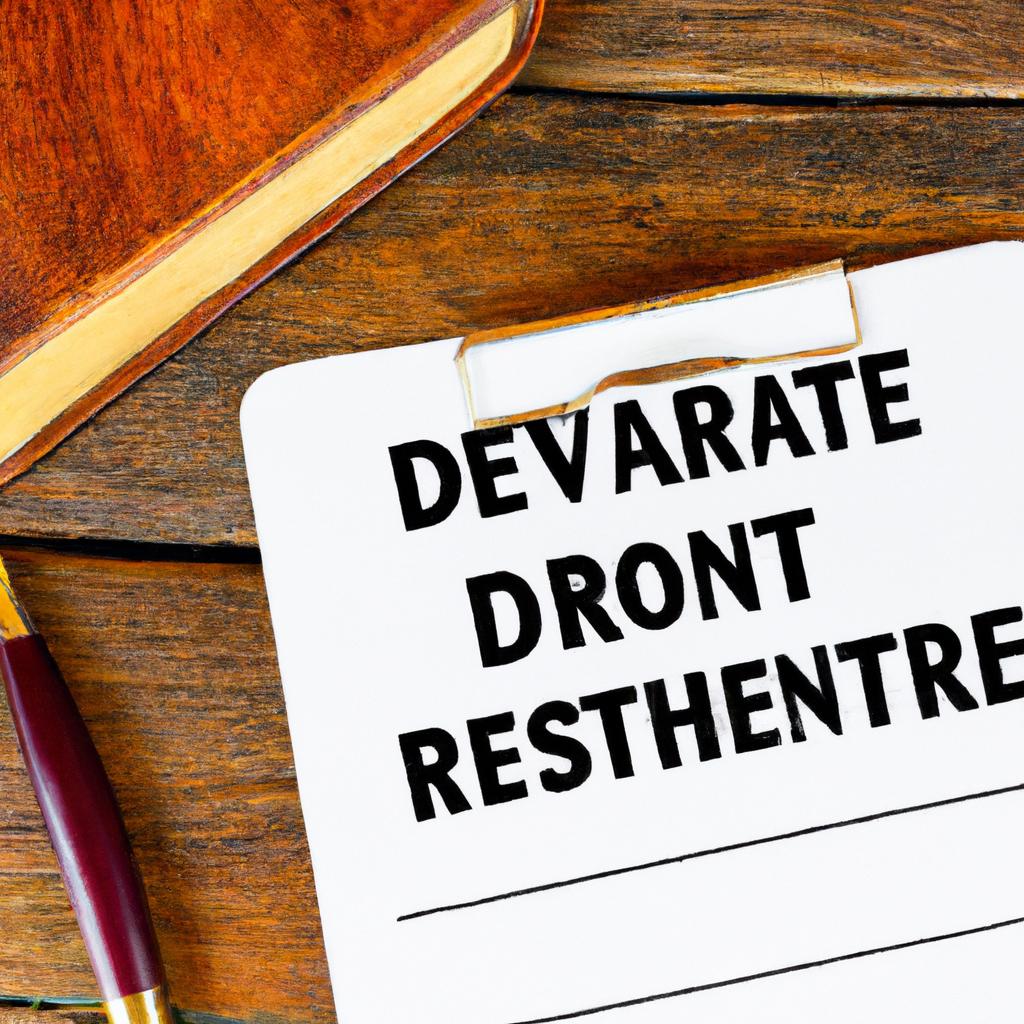When it comes to end-of-life care decisions, the issue of a Do Not Resuscitate (DNR) order can often be a point of contention among family members. While a DNR is typically a legally-binding document that outlines an individual’s wishes to forgo certain life-saving measures in the event of a medical emergency, the question of whether or not family members have the authority to revoke a DNR is a complex and nuanced one. In this article, we will explore the legal implications of revoking a DNR order and the factors that must be considered in such a situation. As experienced attorneys at Morgan Legal Group in New York City, we specialize in estate planning, probate, elder law, Wills, and trusts, and we are here to provide guidance on this important issue.
Revocation of a Do Not Resuscitate Order by Family Members: Understanding the Process
In certain circumstances, a Do Not Resuscitate (DNR) order can be revoked by family members. It is important to understand the process and implications of revoking a DNR order on behalf of a loved one. While the decision to revoke a DNR order should not be taken lightly, there are legal mechanisms in place to ensure that the wishes of the patient and their family are respected.
When considering whether to revoke a DNR order, it is crucial to consult with medical professionals, legal experts, and other relevant parties. In some cases, revoking a DNR order may involve filling out paperwork, providing documentation, or seeking approval from a healthcare proxy or legal guardian. It is important to carefully consider all options and implications before making a decision that could have significant consequences for the patient’s medical care and well-being.

Legal Considerations and Implications of Revoking a DNR on Behalf of a Loved One
In the event that a family member wishes to revoke a Do Not Resuscitate (DNR) order on behalf of a loved one, there are several legal considerations and implications that must be taken into account. It is crucial to understand that the decision to revoke a DNR is a serious matter and should only be made after careful deliberation and consultation with legal professionals. Below are some key points to consider:
- Legal Capacity: It is important to ensure that the loved one in question has the legal capacity to make decisions about their own healthcare. If there are concerns about their mental capacity, it may be necessary to seek a guardianship or conservatorship in order to make decisions on their behalf.
- Consent: In order to revoke a DNR order on behalf of a loved one, you must have their explicit consent. If the loved one is unable to communicate their wishes, it may be necessary to provide evidence of their prior wishes or preferences.
- Medical Advice: It is highly recommended to consult with medical professionals, such as the loved one’s primary care physician or healthcare provider, before making any decisions about revoking a DNR order. They can provide valuable insight and guidance based on the loved one’s medical condition and prognosis.

Factors to Consider Before Revoking a DNR: Guidance from Experienced Estate Planning Attorneys
When considering revoking a Do Not Resuscitate (DNR) order, there are several important factors that must be carefully weighed. At Morgan Legal Group, our experienced estate planning attorneys understand the complex nature of these decisions and can provide valuable guidance to families facing this difficult choice.
- Medical Condition: The current medical condition of the individual must be thoroughly assessed before revoking a DNR. It is essential to consult with healthcare professionals to understand the potential risks and benefits of resuscitation.
- Legal Implications: Revoking a DNR involves legal considerations that must be addressed. Our attorneys can help navigate the legal process and ensure that all necessary documentation is completed correctly.
- Family Dynamics: The wishes of the family members and loved ones of the individual must also be taken into account when revoking a DNR. Open communication and support are crucial during this challenging time.

Ensuring Clarity and Compliance in Revoking a DNR: Best Practices and Recommendations
Revoking a Do Not Resuscitate (DNR) order is a crucial decision that requires careful consideration and adherence to legal guidelines. When it comes to the question of whether a DNR can be revoked by family members, the answer is not as straightforward as one might think. In most cases, the individual who originally signed the DNR must be the one to revoke it. However, in situations where the patient is incapacitated or unable to communicate their wishes, family members may be able to step in and make decisions on their behalf.
The process of revoking a DNR involves several key steps to ensure clarity and compliance with legal requirements. First and foremost, it is essential to consult with a qualified legal professional to understand the specific laws and regulations in your jurisdiction. Additionally, it is important to communicate clearly with healthcare providers and ensure that all parties involved are aware of the decision to revoke the DNR. Keeping detailed records of all discussions and decisions made throughout the process can help to avoid any misunderstandings or disputes in the future. By following best practices and recommendations, you can navigate the process of revoking a DNR with confidence and peace of mind.
Q&A
Q: Can a Do-Not-Resuscitate (DNR) order be revoked by family members?
A: Yes, a DNR order can be revoked by family members under certain circumstances.
Q: What are those circumstances?
A: Family members can request to revoke a DNR order if they feel that the patient’s wishes have changed, or if they believe that the patient was not of sound mind when the order was originally put in place.
Q: How can family members go about revoking a DNR order?
A: Family members should discuss their concerns with the patient’s healthcare provider or legal guardian, and provide any necessary documentation or evidence to support their request for revocation.
Q: Are there any legal processes involved in revoking a DNR order?
A: Depending on the state or jurisdiction, there may be specific legal procedures that need to be followed in order to officially revoke a DNR order. It is important to consult with legal professionals for guidance in this matter.
Q: Can a patient override a family member’s request to revoke a DNR order?
A: Ultimately, a patient’s wishes regarding their medical care should be honored, unless there are legal reasons to override them. It is important for all parties involved to communicate openly and honestly about their wishes and concerns.
The Conclusion
In conclusion, the decision to revoke a Do Not Resuscitate (DNR) order by family members can be a complex and delicate process. It is important to consider the wishes of the individual in question, as well as any legal implications that may arise. Ultimately, collaborative communication and understanding among all parties involved is crucial in navigating this sensitive issue. Remember, at the heart of it all, the goal is to ensure the best possible care and respect for the individual’s wishes. Thank you for reading.
 “Can a DNR be Revoked by Family: Understanding the Legalities and Process”
“Can a DNR be Revoked by Family: Understanding the Legalities and Process”
A Do-Not-Resuscitate (DNR) order is a legal document that instructs healthcare professionals not to perform CPR (cardiopulmonary resuscitation) if an individual’s heart stops beating or they stop breathing. This allows patients to control their end-of-life care and avoid unwanted medical interventions. However, there may be situations where the family of a patient may wish to revoke a DNR order. This raises the question, can a DNR be revoked by family? In this comprehensive article, we will delve into the legalities and process of revoking a DNR order and provide valuable insights for families and patients.
Understanding the Purpose of a DNR Order
Before we dive into the topic of revoking a DNR order, it is crucial to understand its purpose and significance. A DNR order is a legal document that expresses an individual’s wish not to undergo CPR in case of a medical emergency. It is typically used when an individual’s health status is terminal, and they do not want to be resuscitated. This decision can be made by the patient themselves or their legal representative, such as a healthcare proxy or a family member.
The Importance of a DNR Order
A DNR order is an essential document for patients and their families. It ensures that their end-of-life wishes are respected and allows them to have control over their medical treatment. Without a DNR order, healthcare professionals are obligated to perform CPR in cases of medical emergencies. This can lead to unwanted measures being taken, causing pain and suffering for the patient. By having a DNR order in place, patients can avoid unnecessary medical interventions and maintain a sense of dignity during their end-of-life journey.
Reasons for Revoking a DNR Order
While a DNR order is a legally binding document, there may be situations where the patient or their family may want to revoke it. Some of the common reasons for revoking a DNR order include:
– Change in the patient’s medical condition: A DNR order is often issued when a patient’s health status is terminal. However, there may be cases where the patient’s condition improves, and they may wish to be resuscitated in case of an emergency.
– Family dynamics: A DNR order may have been issued when the patient’s family was in disagreement about whether to resuscitate them or not. As the family dynamics change, the patient may want to revoke the DNR order to reflect their current wishes.
– Advance directives: In some cases, a DNR order may have been issued without the patient’s knowledge or consent. If the patient has an advance directive in place, they may revoke the DNR order by updating their wishes in the document.
Legalities of Revoking a DNR Order
The process of revoking a DNR order varies depending on the state’s laws and the healthcare facility where the order was issued. In most cases, the patient or their legal representative will need to provide written, informed consent to revoke the DNR order. This means that the healthcare team will sit down with the patient or their representative and explain the implications and potential risks of revoking the DNR order.
The Role of Healthcare Professionals
As medical professionals, it is vital to respect the patient’s wishes, even if it means revoking a DNR order. In such cases, it is crucial to have open and honest communication with the patient and their family and ensure that they understand the implications of revoking the order. It is also essential to have documentation of all discussions and consent forms to protect both the healthcare team and the patient’s rights.
Practical Tips for Revoking a DNR Order
If a patient or their family wishes to revoke a DNR order, the following tips may help ease the process:
– Speak to the primary physician: The first step is to discuss the decision with the patient’s primary physician. They can provide valuable insights into the medical implications and guide the family in the revocation process.
– Have a family meeting: It is crucial to have a family meeting and discuss the decision to revoke the DNR order together. This will ensure that all family members are on the same page and can provide the necessary support to the patient.
– Provide written and informed consent: As mentioned earlier, it is essential to provide written and informed consent to revoke a DNR order. This ensures that everyone understands the decision and its implications.
– Update advance directives: It is also crucial to update any advance directives and legal documents, such as power of attorney or living will, to reflect the patient’s current wishes.
Benefits of Revoking a DNR Order
Revoking a DNR order can have various benefits for the patient and their family, such as:
– Improved quality of life: By revoking a DNR order, the patient may have a better quality of life knowing that they have the option of being resuscitated if needed.
– Increased peace of mind: For families, revoking a DNR order may bring peace of mind, knowing that their loved one’s wishes are being respected, and they have a say in their end-of-life care.
– Opportunities for communication: The process of revoking a DNR order can create opportunities for open and honest communication between the patient, their family, and healthcare professionals.
In conclusion, while a DNR order is a legally binding document, it can be revoked by the patient or their family under certain circumstances. By understanding the legalities and process of revoking a DNR order, families can make informed decisions in line with their loved one’s wishes and ensure that they receive the best possible end-of-life care. It is crucial to have open and honest communication between the patient, their family, and healthcare professionals, and to respect the patient’s autonomy and right to self-determination.







